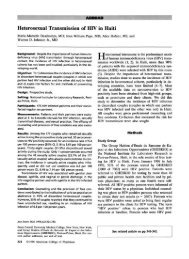Behavioural Surveillance Surveys - The Wisdom of Whores
Behavioural Surveillance Surveys - The Wisdom of Whores
Behavioural Surveillance Surveys - The Wisdom of Whores
You also want an ePaper? Increase the reach of your titles
YUMPU automatically turns print PDFs into web optimized ePapers that Google loves.
If successful prevention initiatives contribute<br />
to new norms <strong>of</strong> safe behavior, annual data<br />
collection may no longer be needed. While<br />
less frequent data collection will save cash, it<br />
also bears a cost. Annual data collection feeds<br />
into programming, providing information for<br />
the constant re-evaluation <strong>of</strong> prevention<br />
needs. Undertaking the exercise regularly<br />
maintains skills and capacity within local<br />
institutions. And regular publication <strong>of</strong> this<br />
information has the added advantage <strong>of</strong><br />
keeping HIV prevention needs in the public<br />
eye, and on the agenda <strong>of</strong> policy-makers.<br />
<strong>The</strong> cost <strong>of</strong> BSS<br />
<strong>The</strong> cost <strong>of</strong> collecting behavioral data varies<br />
greatly from country to country and depends<br />
on the number <strong>of</strong> respondents, the geographic<br />
coverage, the sampling design, and the<br />
frequency and methods <strong>of</strong> data collection.<br />
Nationally-representative household surveys<br />
are typically the most expensive, costing<br />
around US$250,000 in a developing country <strong>of</strong><br />
30 million people. Where other information<br />
are being collected simultaneously, these costs<br />
can be shared with other users such as maternal<br />
and child health programs.<br />
BSS are less expensive (partly because<br />
sample sizes are much smaller and geographical<br />
coverage more limited). <strong>The</strong>y tend, however,<br />
to be more frequent. Initial rounds <strong>of</strong> BSS,<br />
which may include formative research to<br />
determine the most appropriate population<br />
groups, and extensive training and mapping<br />
work, are likely to be more expensive than<br />
subsequent rounds. As BSS becomes a routine<br />
part <strong>of</strong> monitoring and evaluation <strong>of</strong> the<br />
national response to HIV, costs drop because<br />
more experience is gained about how to<br />
efficiently sample and interview sub-population<br />
groups.<br />
Behavioral data collection is generally a<br />
fairly resource-intensive business, and it is<br />
especially heavy on human resources. But if<br />
the results <strong>of</strong> the data collection are combined<br />
with other elements <strong>of</strong> a surveillance system to<br />
improve programs that successfully prevent<br />
HIV or minimize its impact, these costs are<br />
more than justified. Set against the costs <strong>of</strong><br />
behavioral data collection are the economic<br />
benefits <strong>of</strong> targeting prevention activities<br />
most effectively. This would not be possible<br />
without a systematic and reliable way <strong>of</strong><br />
tracking trends in risk behavior over time,<br />
such as that provided by BSS.<br />
Issues and limitations in<br />
behavioral data collection<br />
Validity <strong>of</strong> self-reported data about sex and<br />
drug-taking<br />
One reason there has not been more<br />
behavioral data collected in the past is that<br />
many people are deeply skeptical about the<br />
validity <strong>of</strong> self-reported data on sexual<br />
behavior or illegal activities such as drug<br />
injection. Growing experience in collecting<br />
data on sexual behavior indicates that people<br />
do not generally lie. <strong>The</strong>y are, however, more<br />
likely to tell the truth in some situations than<br />
in others. <strong>The</strong> more stigmatized the behavior,<br />
the more likely people are to lie about it.<br />
<strong>The</strong> extent to which people answer questions<br />
about sex openly and truthfully also depends<br />
on the setting <strong>of</strong> the question. Are privacy<br />
and confidentiality assured ? Is the interviewer<br />
sympathetic, and <strong>of</strong> the same sex and age<br />
bracket as the respondent ? Are questions<br />
non-judgmental ?<br />
B EHAV I OR A L S U R V EI L L A NC E SURV EY S CHAPTER 1<br />
7










